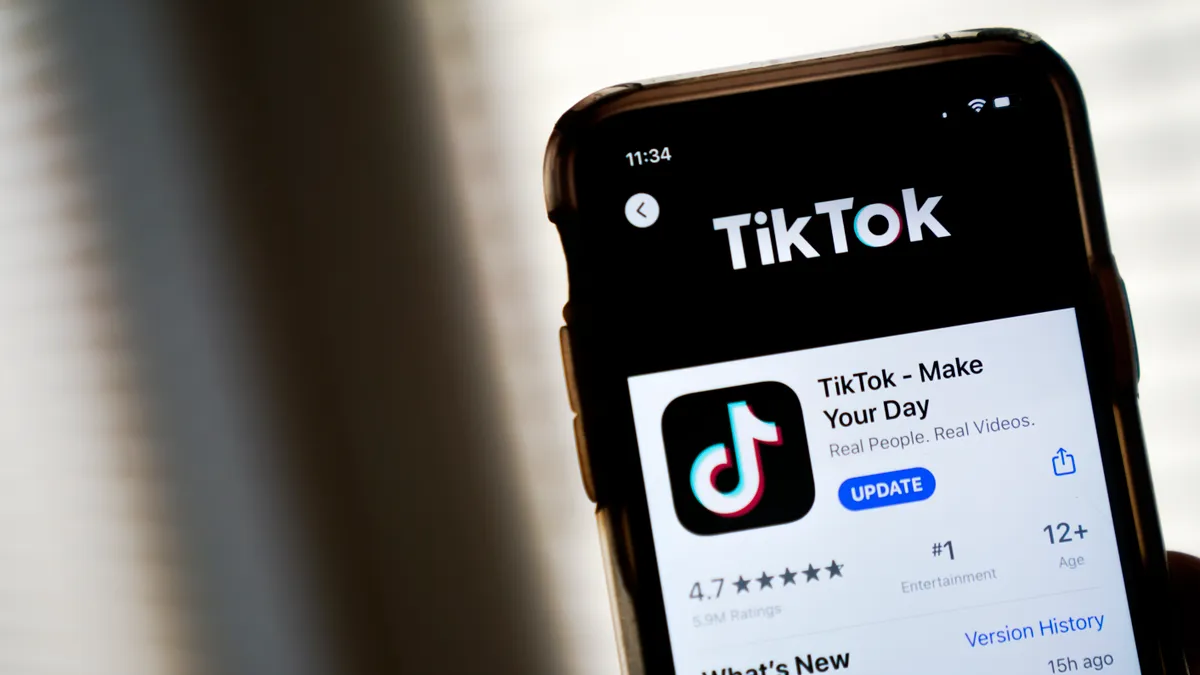Colleges across the U.S. have spent years hollowing out niches on TikTok, the social media app du jour where users can choreograph brief dance routines and engage in lip sync battles.
Admissions offices have set up accounts to woo potential students. Athletics and communications departments have relied on it to tout campus events. But for some institutions, using TikTok as of late has grown far more complex — or downright impossible.
At least 19 states have banned TikTok in some fashion from government-issued devices. This prohibition has trickled down to public colleges, some of which have restricted the app — like blocking access to it on their wireless networks.
Policy debates about the app date to the tenure of former President Donald Trump, whose administration tried and failed to shut down TikTok. Fears abounded then that the popular app created a window for China into American users’ personal data, as it’s owned by Chinese company ByteDance. As of 2021, TikTok reached 1 billion monthly users globally.
Privacy concerns reared up again last June, when Buzzfeed reported ByteDance’s employees in China repeatedly accessed some nonpublic data about U.S. TikTok users. In December, the director of the FBI publicly brought up worries about TikTok. And later that month, Forbes found ByteDance employees had even tracked the physical location of several of its journalists.
Since then, President Joe Biden signed a spending package that outlaws TikTok on the federal government's devices, with more possible restrictions to come on the app.
Below, we’ve collected a sample of state actions against TikTok and how that affects public colleges in different parts of the country.
Alabama
At least one prominent public college, Auburn University, opted to excise TikTok from its devices and wireless network following an executive order from Republican Gov. Kay Ivey on Dec. 12.
Ivey ended use of TikTok on state devices.
Auburn officials, citing privacy concerns, sent a memo to campus recommending TikTok be removed from personal devices as well.
"The governor's order addresses the growing risk of intrusive social media applications harvesting data totally unrelated to business use of the platform,” the memo states, Insider reported.
Georgia
The University System of Georgia, a collection of 26 public institutions, banned TikTok from all of its computers and mobile devices. This was after Gov. Brian Kemp, a Republican, on Dec. 15 blocked the app, as well as two popular messaging services, WeChat and Telegram, from government tech.
Georgia law doesn’t enable the governor to directly give orders to public colleges, so the system’s choice is its own.
Idaho
Idaho Gov. Brad Little, a Republican, issued an executive order Dec. 14 that barred TikTok on state devices and networks. Little at the time denounced China as a communist threat.
In turn, Idaho’s public colleges began blocking access to TikTok on their networks. Of course, students and employees can just disconnect from those networks and view the app via their personal networks or data plans. Public institutions also started deleting their TikTok accounts.
Montana
Montana Gov. Greg Gianforte, a Republican, on Dec. 16 announced his own government prohibition on TikTok.
Then, just this week, Gianforte urged Montana University System regents to support an effort to prevent use of TikTok on system devices and on its Wi-Fi networks.
“The ability of the Chinese Communist Party (CCP) to spy on Americans using TikTok is well documented. Using or even downloading TikTok poses a massive security threat,” Gianforte wrote in a letter to the regent board.
Oklahoma
A few Oklahoma public colleges, like University of Oklahoma and Oklahoma State University, have moved to prohibit TikTok on campus devices and wireless networks after the state’s Republican governor, Kevin Stitt, on Dec. 8 took executive action against the app.
However, these moves appear to not be in response to firm directives stemming from Stitt’s executive order but rather the universities’ legal interpretation of it. Stitt told a local news station last month he didn’t expect the order would impact colleges.
Stitt said, though, he supported colleges taking action themselves on TikTok.
Texas
Several Texas public institutions, among them Texas A&M University, the University of Houston and Texas Tech University, have scrubbed TikTok from campus devices and stopped posting on accounts.
This follows Gov. Greg Abbott on Dec. 7 banning its use on any government computer or phone.
“TikTok harvests vast amounts of data from its users’ devices — including when, where, and how they conduct Internet activity—and offers this trove of potentially sensitive information to the Chinese government,” Abbott wrote in a letter.









